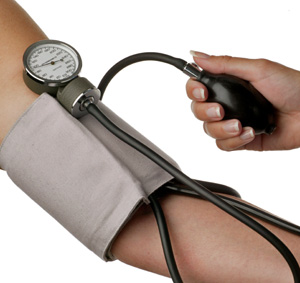
The condition, also known as hypertension can be treated by altering lifestyle factors – such as cutting down on salt in diet and exercising.
However, high blood pressure can also be treated with medication.
There are a number of reasons a doctor might prescribe medication for a patient with high blood pressure.

NICE guidance said: “Your doctor should offer you drug treatment if your blood pressure is considered to be high and any of the following apply to you.”
The list includes:
- Having damage to the blood vessels in your heart, brain, kidneys or eyes
- You have cardiovascular disease
- You have kidney disease
- You have diabetes
- Your likely risk of developing cardiovascular disease during the next ten years in 20 per cent or more
- Your clinic blood pressure is 160/100mgHg or above and your average ambulatory or home blood pressure is 150/95 mmHg or above.
A normal blood pressure is considered to be around 120/80.
High blood pressure can put extra strain on blood vessels, the heart and other organs such as the brain, kidneys and even eyes.
Persistently high blood pressure can increase the risk of life-threatening conditions such as heart disease, heart attacks, strokes, dementia and kidney disease.
People diagnosed with high blood pressure are sometimes prescribed medications which usually need to be taken once a day.
Common blood pressure medications include ACE inhibitors, angiotensin-2 receptor blockers (ARBs), calcium channel blockers, diuretics, beta blockers, alpha blockers, renin inhibitors and other diuretics.
The are side effects associated with some of the medications.
The systolic pressure – which is the top number is the force behind the heart pumping.
It measures the pressure when the heart contracts and blood is forced through the arteries.
The second number – the diastolic blood pressure is the bottom number and that is the lowest levels your resting pressure – the lowest level blood pressure reaches.
High blood pressure is more likely in people over the age of 65, those who are overweight or obese, people of African or Caribbean descent, people who eat too much salt – and not enough fruit and vegetables and people who drink too much alcohol.
Smoking can also increase risk, and people are also urged to get six hours of sleep a night.
Source :-Express.co.uk

Leave a Reply